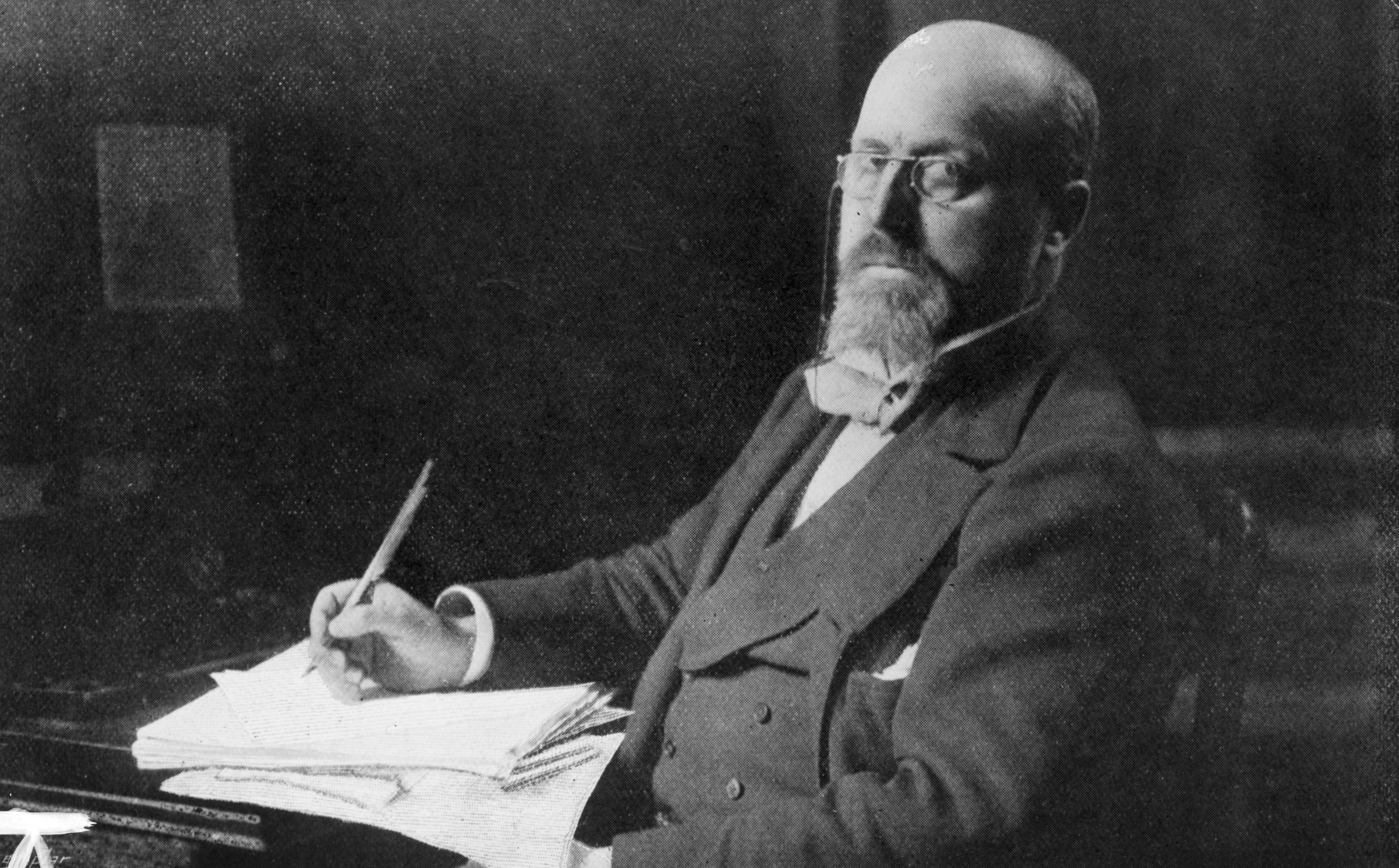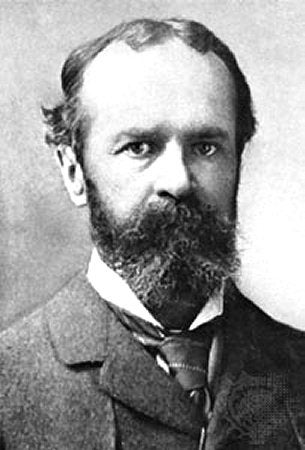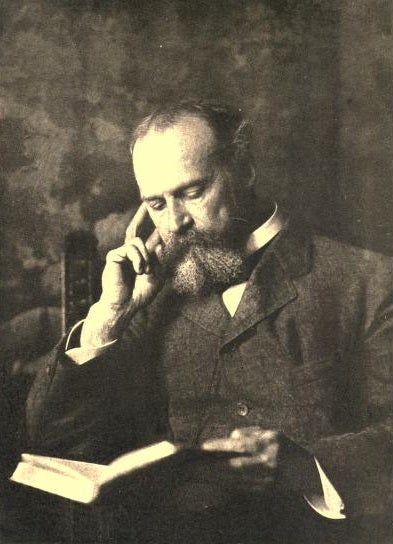William James: founder of the first homegrown American school of philosophy
What difference could a life make if every action, thought and hope were caused by prior events, asked William James

William James (1842–1910) was the brother of the novelist Henry James. Along with CS Peirce, James would achieve his own recognition with the founding of the first homegrown American school of philosophy: pragmatism.
In 1905, William James (1842-1910) recorded the following entries in his diary, as he considered the possibility of retiring from professional teaching: 26 October, “Resign!”; 28, “Resign!!!”; 4 November, “Resign?”; 7, “Resign!”; 8, “Don’t resign”; 9, “Resign!”; 16, “Don’t resign!”; 23, “Resign”; 7 December, “Don’t resign”; 9, “Teach here next year”. He continued at Harvard until somehow managing to resign in 1907. You can form the impression from this, probably rightly, that James’s mind moved in several directions at once. Possibly this trait nearly killed him, but it also provided the roots for pragmatism, the first homegrown American philosophical movement.
Many commentators trace James’s breathtaking indecisiveness to the fact that he spent his childhood in a kind of benevolent upheaval. James’s grandfather, an Irish immigrant, was a multimillionaire, and, following his death, James’s father Henry enjoyed financial independence. This was probably just as well, as Henry James was something of a restless intellectual, with religious aspirations but no head for business, and the income enabled him to pursue his interests and devote himself to his children’s education. The five children – James’s brother Henry was the well-known novelist – were taught to think freely and fiercely, with breakfast table discussion ranging as widely as their interests carried it. The family moved regularly back and forth between the United States and Europe, largely with the aim of gaining the best possible education for the children. They spoke many languages between them and had a decidedly cosmopolitan tolerance for the beliefs of others. James was able to see virtually every side of every argument or possible choice, the merits and disadvantages of all.
While this is usually an attractive character trait, it led to James’s near-paralysis with respect to life choices. James suffered from insomnia, bad eyesight and back problems all his life, but there was also always an undercurrent of depression compounding the physical misery. Some argue that his depression grew from his inability to come to the conclusion that what he was doing with his life was right in the face of the many alternatives his disposition easily brought into view. His family moved to Rhode Island so that James could study art – some of his excellent portraits survive and are worth a look – but he dropped it within a year and enrolled in the Lawrence Scientific School at Harvard. Still unsure that the laboratory bench was the right place for him, he took a place at the Harvard Medical School. He interrupted this with a year-long expedition to the Amazon with the bizarre anthropologist Louis Agassiz. He found himself nearly middle-aged and with no clear idea of what to do with his life.
On determinism
This uncomfortable feeling was made worse by philosophical worries about the possible truth of determinism. What difference could a life make if every action, thought and hope were caused by prior events? What meaning could a life have at all? At the heart of his crisis, too, was a conflict between religion and science. James’s father came under the influence of the dubious Emanuel Swedenborg, and spent a life working through his own conception of religious belief. No doubt James felt some pressure to adopt his father’s religiosity. However, James himself, though possessed of no small artistic and literary talent, felt drawn to the hard facts of scientific enquiry. The pain of this conflict, as well as his directionless life, combined with the possibility that there was no free choice available that might lead to a resolution, was nearly too much for him. Suicide became a serious consideration.
Truth, for James, consists partly in the usefulness of an idea, and usefulness is a complex matter
A philosophical conversion seemed to save him. James read the work of the French philosopher Charles-Bernard Renouvier and found in it an unusual solution to the problems posed by determinism. Renouvier argues that free will consists in “the sustaining of a thought because I choose to when I might have other thoughts”. One might not be able to choose which thoughts come into the mind, but an act of will can focus the mind on some thoughts at the expense of others, thoughts that then determine action. It led James to the view that neither the thesis of determinism nor free will is provable, leaving room for a kind of choice based on the practical consequences of adopting one or the other position. James opted for free will and, in so doing, seemed to get it. Here is a kind of kernel of pragmatism, as we shall see.
James got himself underway. He was commissioned to write a textbook on the new science of psychology. Predictably, it was published 10 years behind schedule and did not resemble a textbook in the slightest. It was The Principles of Psychology, and its influence was immediate, lasting and large.
The book is positivist in flavour, and attempts to make the psychological study of mind a part of natural science, showing how mental life and visible bodily life are connected. The mark of the mental, for example, becomes a question of identifying the characteristic behaviour of things with minds. According to James, such things exhibit plastic or flexible goal-directed behaviour – they make choices that enable them to get what they want despite obstacles. James, under the sober influence of Darwin, is then led to reasonable reflection on the point and purpose of mind from an evolutionary point of view. Put a minded thing up against a mere automaton, and the minded thing will outperform the mechanism every time.

Perhaps the most interesting part of the book is the chapter on consciousness, which James famously characterises as “the stream of thought”. Breaking with the traditional view of, say, sense perception as repeatable inner images – seeing the same dead ant on your nightstand today as yesterday involves the same thing happening in conscious experience – James argues that consciousness is in a constant state of flux. Consciousness, for James, is also personal: it is owned or belongs to someone, with all the mental baggage this entails. As such, the vagaries of personal circumstance do more than just flavour experience, ensuring that the stream is always changing; circumstances “make the various streams distinct. No matter what your powers of empathy are, you will never feel my pain.
James’s consideration of the self broke with tradition too. Instead of talk of ghostly souls or some other substance on which to hang the draperies of personal identity – what it is which makes you you over time – he distinguishes between the “I” and the “me”. The material me is made up of objects to which I have a kind of emotional attachment or personal interest: family, friends and valued possessions. The social part of me consists in the roles I play in different social circumstances. Cherished values make up the spiritual me. My best hopes for me are the ideal me. The “I” for James is closer to the usual notion of ego or self, but he identifies it with something nearly Aristotelian: a kind of activity that consists in one’s present thinking.
Pragmatism
Following the publication of The Principles of Psychology, James seems to have all but dropped his interest in psychology for philosophy, attempting in particular to reconcile the tension he felt between the religious impulse and the hard-headed demands of scientific enquiry. The result is an articulation of pragmatism, a term borrowed from his friend Peirce, who argued that pragmatic concerns should guide our understanding of truth and meaning. James fleshed out the view in accord with his own concerns. His expressed contention that philosophy ought to be concerned with the lives of everyday people is responsible for another large difference between James and Peirce. James’s writing is much less technical than Peirce’s. With James we get a little less clarity in exchange for a lot more readability.

James’s opinion of pragmatism certainly had something to do with his escape from suicide. Truth, for James, consists partly in the usefulness of an idea, and usefulness is a complex matter. The simple-minded objection to pragmatism, that it is nothing other than a free licence to believe whatever makes a person feel a little better, misses at least a part of the point. Usefulness for James depends not just on the extent to which an idea pushes one towards a better life, but also on the predictive power an idea might confer – the view is in line with James’s radical empiricism. James also argues that an idea of x is only a useful idea if it helps one deal with x should x exist. Truth really does correspond to reality for the pragmatist. Further, ideas must be consistent with other ideas to stand a chance of being true. There are elements of coherentism here too.
The emphasis, though, is clearly on what difference the idea makes for practical affairs. As James puts it:
“Pragmatism asks its usual question. ‘Grant an idea or belief to be true,’ it says, ‘what concrete difference will its being true make in anyone’s actual life? How will the truth be realised? What experiences will be different from those which would obtain if the belief were false? What, in short, is the truth’s cash value in experiential terms?’”
The view provides a decision procedure for dealing with metaphysical disputes. To use James’s example, suppose you were circling a tree, trying to have a glimpse of a squirrel who is matching your movements around the tree too. If someone asks, “Are you going around the squirrel?”, you can interpret the question in at least two ways, but what possible difference to human conduct could your answer make? Philosophical disputes are often merely linguistic in just this way. Where there’s no difference for practice – no cash value – there’s no difference at all.
James is subject to considerable criticism concerning his religious views. He argues that empirical evidence cannot decide the matter of God’s existence, and so a part of the decision consists in plumping for the belief which most improves life. Belief in God wins, just, because it leads one to a better attitude towards the future and puts some much-needed meaning into life.

Can one really just will into belief something like this? Apparently, James both thought so and did so. You can hear something of the escape from suicide in all of this. It certainly was James’s view that philosophy should take some of the sting out of existence, as it clearly did for him. He urges us to “believe that life is worth living and your belief will help create the fact”. One can quibble with James’s arguments, but it is hard to find a reason to object to his motivations.
Major works
The Principles of Psychology (1890)
James’s long and bold treatment of mind. It includes his famous account of the stream of consciousness, the “I” as opposed to the “me”, and free will.
The Will to Believe and Other Essays in Popular Philosophy (1897)
A collection of papers on such topics as rationality, determinism, morality and the meaning of life. It expounds James’s view that some questions force a choice even when the evidence is inconclusive. On such occasions, some answers contribute to a better life than others, and this gives us a right to believe them.
The Varieties of Religious Experience (1902)
James’ study of human nature, in particular, that aspect of human nature which is concerned with religious experience.
Pragmatism (1907)
A collection of lectures on the pragmatic theory of truth, meaning, knowledge and the pragmatic method of resolving philosophical questions.




Join our commenting forum
Join thought-provoking conversations, follow other Independent readers and see their replies
Comments